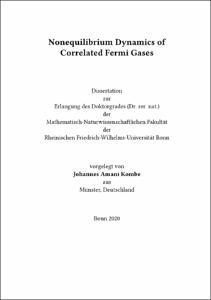Nonequilibrium Dynamics of Correlated Fermi Gases

Nonequilibrium Dynamics of Correlated Fermi Gases

| dc.contributor.advisor | Kollath, Corinna | |
| dc.contributor.author | Kombe, Johannes Amani | |
| dc.date.accessioned | 2020-10-26T15:10:48Z | |
| dc.date.available | 2020-10-26T15:10:48Z | |
| dc.date.issued | 26.10.2020 | |
| dc.identifier.uri | https://hdl.handle.net/20.500.11811/8733 | |
| dc.description.abstract | Strongly correlated quantum systems display a myriad of complex, fascinating behaviour. The competition between charge, spin, orbital, or lattice degrees of freedom and their respective energy scales gives rise to rich and complex emergent phases. More recently, the non-equilibrium properties of correlated quantum many-body systems have come into the focus of active research, with remarkable advances. While the advent of tensor network based simulations on the theoretical side has allowed access to the full time-evolution of the quantum state as it traverses the Hilbert space, the experimental progress in the ultracold atom community has allowed physicists to enter the paradigm of analog quantum simulation. Their tunability and isolation from the environment makes them ideal platforms to emulate and study open problems in condensed matter physics and go beyond the simulational capabilities of state of the art classical simulations. In this thesis, we explore the dynamics of correlated Fermi gases. We develop and present different facets of applicability of radiofrequency modulation techniques to drive the system out of equilibrium. We begin by considering a homogeneous, three-dimensional Fermi gas in the BCS-BEC crossover and develop an off-resonant radiofrequency transfer scheme to excite the Higgs mode of the superfluid. In a subsequent study we investigate the tunability of the coherence between Cooper pairs by tuning the duration of interaction ramps of the internal interaction strength. These works highlight the possibility to externally tune and stabilise complex quantum many-body states away from equilibrium. Using quasi-exact matrix product state simulations, we study the response of an attractively interacting, one-dimensional Fermi-Hubbard model to weak radiofrequency perturbations. We reveal the emergence of two distinct dynamical regimes in the time evolution and are able to relate it back to the underlying excitation spectrum of the system. Finally, we explore the possibility to perform quantum quenches through radiofrequency π-pulses, achieving nearly complete population transfer between different interacting fermionic states. We reveal non-trivial dynamical effects in the pair correlation of the final state, as well as the excitation of a collective trap mode of the system. | en |
| dc.language.iso | eng | |
| dc.rights | In Copyright | |
| dc.rights.uri | http://rightsstatements.org/vocab/InC/1.0/ | |
| dc.subject | Nichtgleichgewichtsdynamik | |
| dc.subject | Matrixproduktzustände | |
| dc.subject | Theorie Kondensierter Materie | |
| dc.subject | Kalte Atome | |
| dc.subject | Non-Equilibrium Dynamics | |
| dc.subject | Matrix Product States | |
| dc.subject | Condensed Matter Theory | |
| dc.subject | Cold Atoms | |
| dc.subject.ddc | 530 Physik | |
| dc.title | Nonequilibrium Dynamics of Correlated Fermi Gases | |
| dc.type | Dissertation oder Habilitation | |
| dc.publisher.name | Universitäts- und Landesbibliothek Bonn | |
| dc.publisher.location | Bonn | |
| dc.rights.accessRights | openAccess | |
| dc.identifier.urn | https://nbn-resolving.org/urn:nbn:de:hbz:5-59946 | |
| ulbbn.pubtype | Erstveröffentlichung | |
| ulbbnediss.affiliation.name | Rheinische Friedrich-Wilhelms-Universität Bonn | |
| ulbbnediss.affiliation.location | Bonn | |
| ulbbnediss.thesis.level | Dissertation | |
| ulbbnediss.dissID | 5994 | |
| ulbbnediss.date.accepted | 29.09.2020 | |
| ulbbnediss.fakultaet | Mathematisch-Naturwissenschaftliche Fakultät | |
| dc.contributor.coReferee | Diehl, Sebastian |
Files in this item
This item appears in the following Collection(s)
-
E-Dissertationen (4442)




